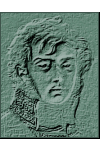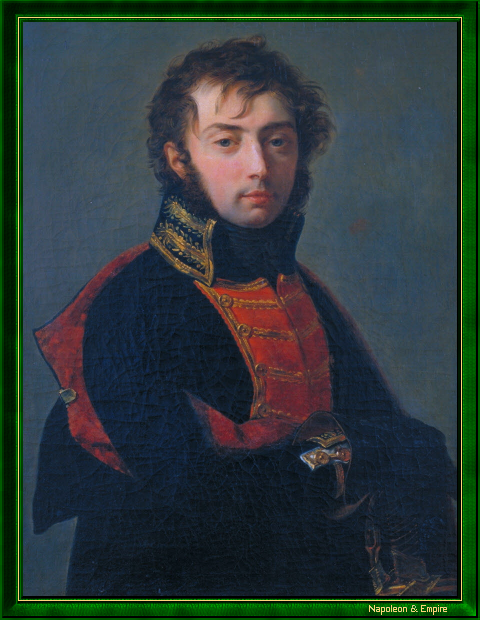Pronunciation:

Barthélémy Catherine Joubert (1769-1799) was born on April 14, 1769, into a bourgeois family in Pont-de-Vaux, a village at that time in the province of Bresse, today in the department of Ain. His father is a lawyer.
Joubert fled at the age of fifteen from the Joséphite college of Louhans to enlist in the La Fère artillery regiment. His family found him and forced him to finish his studies, first in Lyon then in Dijon, where he took law courses.
Supported by revolutionary ideals, he enlisted in 1789 in the Dijon citizen guard then, in 1791, in the 3rd battalion of Ain volunteers. He fought on the Rhine and in Italy and quickly rose in rank.
Lieutenant in 1793, he briefly fell into the hands of the Austro-Sardins, which did not prevent him from being promoted to adjutant general in the spring of 1794, after his release.
In 1795, he was appointed adjutant general, chief of brigade in June and then general of brigade in December.
Under the orders of Napoleon Bonaparte, he distinguished himself during the first Italian campaign. After having brilliantly participated in the battles of Montenotte, Millesimo, Mondovi and Lodi, Joubert was elevated to the rank of division general shortly before the battle of Rivoli. His role during this proved essential.
During the movement on Vienna which ended the campaign, he distinguished himself again during the Tyrol expedition, described by Lazare Carnot as a campaign of giants
. The victorious crossing of the Julian Alps remains Joubert's greatest claim to fame.
All these exploits earned him the honor of accompanying his leader when he brought the Treaty of Campo-Formio to the Directory.
In 1797, Joubert took command of the Northern Army, at the head of which he supported the coup d'état carried out by the most radical faction of Dutch revolutionaries.
The following year, he successively commanded the french army of Holland then that of Mainz and finally that of Italy. At the head of the latter, he expelled the king of Sardinia Charles-Emmanuel IV from Piedmont and founded a short-lived Republic of Piedmont. However, he resigned shortly after, to protest against the policy of the Directory in Italy.
On 30 Prairial Year VII (June 18, 1799), Joubert was one of the main supporters of the coup d'état led against their fellow directors by Paul Barras and Emmanuel Siéyès. The latter, preparing a more radical action, had Joubert named commander-in-chief of the french army of Italy, so that he could acquire the popularity he still lacked and become the sword essential to the overthrow of the regime.
Appointed on July 5, 1799, Joubert did not return to his post until August, after having lingered for a month on the way to celebrate his marriage to Zéphirine de Montholon (sister of the future general Charles Tristan de Montholon). He then showed an indecision which ended up giving the Russian general in chief Alexander Suvorov time to gather forces twice his own. On August 15, 1799, the Battle of Novi (August 15, 1799) turned into a disaster. Joubert himself was mortally wounded from the start.
A few months after the battle, Bonaparte, who had become First Consul, had the body of the unfortunate general repatriated. It rests first in a Toulon fort, Fort Lamalgue, also known since then under the name of Fort Joubert. It will then be transferred to the church of his native village.
Barthélémy Catherine Joubert

Joubert's wife, widowed after a month of marriage, married Marshal Étienne Macdonald for the second time.
It was ultimately Napoleon Bonaparte, returning from Egypt, who three months later served as Siéyès' saber during the coup d'état of 18 Brumaire, a saber infinitely more difficult to wield than Joubert would undoubtedly have been.